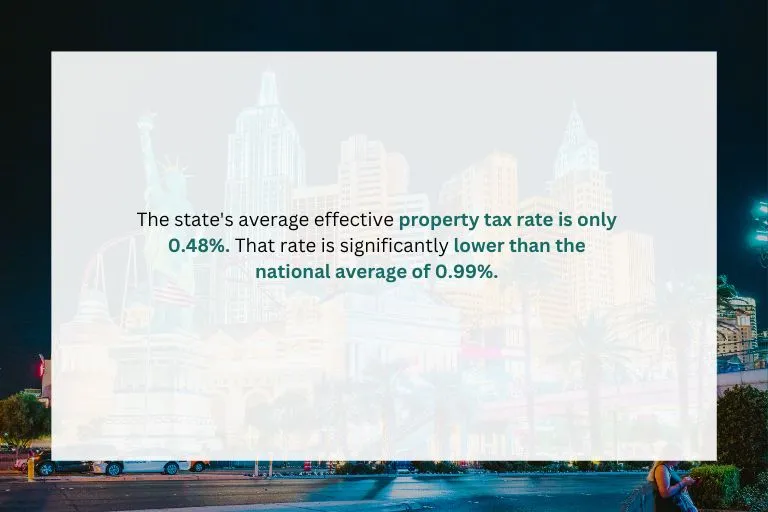
Are you a homeowner or considering purchasing property in Nevada? Understanding property taxes is crucial for making informed financial decisions. In this guide, we’ll delve into everything you need to know about Nevada property taxes in 2024, including rates, calculations, county comparisons, and expert tips to help you manage your tax obligations effectively.
Key Takeaways
- Nevada boasts some of the lowest property tax rates in the United States, with an average effective rate of 0.48%.
- Property taxes in Nevada are based on the market value of the property and the replacement cost of structures.
- Each county in Nevada has multiple tax districts, leading to varying tax rates within the same county.
- The state offers property tax abatement laws to protect homeowners from excessive tax increases.
- Understanding county-specific rates is essential for accurate tax planning and financial management.
What is Nevada Property Tax?
Nevada property taxes fund essential community services such as roads, schools, and police. Despite this, Nevada maintains some of the lowest property tax rates in the country, making it an attractive location for homeowners and investors.
How are Property Taxes Calculated in Nevada?
In Nevada, property taxes are calculated based on both the market value of the property and the replacement cost of any structures on the property. Here’s a step-by-step breakdown:
- Assessing Property Value: County assessors evaluate the market value of the land and the replacement cost of buildings, applying a 1.5% annual depreciation rate since construction.
- Taxable Value: The taxable value is the sum of the land’s cash value and the replacement cost of structures, minus the depreciation.
- Assessed Value: The assessed value is 35% of the taxable value.
- Tax Rate Application: The assessed value is then multiplied by the local property tax rate to determine the annual tax owed.
Benefits of Nevada Property Tax Rates
Nevada’s low property tax rates offer significant financial advantages:
- Affordability: With an average effective rate of 0.48%, homeowners pay less in property taxes compared to the national average of 0.99%.
- Tax Stability: The property tax abatement law limits annual increases to a maximum of 3% for primary residences, providing financial predictability.
- Investment Potential: Lower taxes can enhance the return on investment for property buyers and investors.
What are the Nevada Property Tax Rates?
Nevada tax rates are given in dollars per $100 of assessed value. So, if your tax rate is $3.25 while your assessed worth is $40,000, your total annual tax will be $1,300.
Every Nevada county contains multiple tax districts. Clark County, for example, has 92 different tax districts, each with its own rate structure. Thus, when comparing counties, it is helpful to consider average effective rates.
Example:
Let’s say you live in a specific part of Clark County. Your tax rate might be made up of:
- Clark County General Fund: 1.00%
- City of Las Vegas: 0.50%
- Clark County School District: 1.75%
- Special District (e.g., flood control): 0.25%
This would give you a combined tax rate of 3.50% (this is just an example, your actual rate will vary).
An effective rate is the annual property tax payment expressed as a percentage of the home’s value.
Keep in Mind:
- Tax Caps: Even if rates go up, Nevada law limits how much your property taxes can increase each year (3% for primary residences, 8% for other properties).
- Exemptions: You might qualify for exemptions that reduce your taxable value, which in turn lowers your tax bill.
| County | Median Home Value | Median Annual Property Tax Payment | Average Effective Property Tax Rate |
| Carson City | $198,800 | $1,387 | 0.70% |
| Churchill | $285,100 | $1,835 | 0.64% |
| Clark | $416,900 | $2,334 | 0.56% |
| Douglas | $225,800 | $1,266 | 0.56% |
| Elko | $81,100 | $489 | 0.60% |
| Esmeralda | $151,000 | $369 | 0.24% |
| Eureka | $186,200 | $1,155 | 0.62% |
| Humboldt | $167,400 | $1,203 | 0.72% |
| Lander | $132,600 | $954 | 0.72% |
| Lincoln | $238,600 | $1,360 | 0.57% |
| Lyon | $99,900 | $958 | 0.96% |
| Mineral | $172,300 | $1,088 | 0.63% |
| Nye | $114,400 | $962 | 0.84% |
| Pershing | $264,000 | $1,469 | 0.56% |
| Storey | $360,500 | $2,014 | 0.56% |
| Washoe | $157,100 | $932 | 0.59% |
| White Pine | $299,900 | $1,603 | 0.53% |
Source: SmartAsset
How to Calculate Your Property Taxes in Nevada
Calculating your property taxes in Nevada involves understanding your property’s assessed value and the applicable tax rates:
- Assess Your Home’s Value: Determine the taxable and assessed values based on Nevada’s guidelines.
- Identify Applicable Tax Rates: Research the specific rates in your area, considering multiple layers like state and county taxes.
- Use a Property Tax Calculator: Multiply your assessed value by the applicable effective property tax rate in your county to estimate your annual tax.
For a more accurate calculation, you can use online property tax calculators available on county websites or consult with a financial advisor.
Additional Requirements and Considerations
When dealing with property taxes in Nevada, keep the following in mind:
- Payment Deadlines: Property taxes are due on the third Monday in August, with installment options available if the total tax exceeds $100.
- Exemptions: Nevada offers several property tax exemptions for veterans, seniors, and disabled individuals. Check with your county assessor to see if you qualify.
- Appealing Assessments: If you believe your property’s assessed value is too high, you can appeal it to your county board of equalization.
Frequently Asked Questions (FAQs)
How can you calculate property taxes in states other than Nevada, such as Oregon, Utah, California, Texas, Florida, and New York?
Property taxes in other states can be calculated using online calculators provided by county websites or third-party financial platforms. Each state has its own assessment methods, typically based on property value and local tax rates.
How can you calculate your property taxes in Nevada?
In Nevada, property taxes are calculated by assessing the market value of the property and the replacement cost of structures, applying depreciation, and then multiplying the assessed value by the local tax rate.
How does Nye County’s property tax rate rank compared to other counties in Nevada?
Nye County has an average effective property tax rate of 0.63%, making it the sixth-highest in Nevada.
How do property tax rates vary within different counties in Nevada?
Property tax rates in Nevada vary both between and within counties due to multiple tax districts. For example, Clark County has 92 tax districts, each with its own rate structure.
What is the significance of Douglas County’s high median home value compared to its property tax rate?
Douglas County has the highest median home value in Nevada at $416,900, yet it maintains a relatively low property tax rate of 0.56%, offering financial advantages to homeowners.
What are the property tax implications for moving to Elko County?
Elko County offers one of the lowest property tax rates in Nevada at 0.56%. For a $200,000 home, this results in an annual property tax payment of $1,120, making it an attractive option for those seeking lower tax burdens.
How can a financial advisor assist with understanding the impact of property taxes on financial goals?
A financial advisor can help you understand how property taxes fit into your overall financial strategy, offering personalized planning, local expertise, and cost-free consultations to ensure property taxes align with your long-term goals.
Where to Go for State Property Tax Help
Accurately estimating property taxes is essential to avoid overpaying or underpaying. Here are some resources and services to assist you:
- Nevada Department of Taxation: Access detailed information, publications, and forms related to property taxes. Visit their website here.
- County Assessor’s Office: Contact your local county assessor for information about your property’s assessed value and any exemptions or abatements you may qualify for.
- XOA TAX Live Service: If you need more assistance with your Nevada property tax issues or general state tax facts, XOA TAX can connect you with a knowledgeable tax professional. Get your taxes done by an expert without leaving your home.
Conclusion
Nevada’s low property tax rates make it an appealing state for homeowners and investors alike. By understanding how property taxes are calculated, staying informed about county-specific rates, and utilizing available resources, you can effectively manage your property tax obligations and make informed financial decisions.
Ready to take control of your property taxes? Contact XOA TAX today at +1 (714) 594-6986 or email us at [email protected] for expert assistance.
People Also Read:




 anywhere
anywhere  anytime
anytime